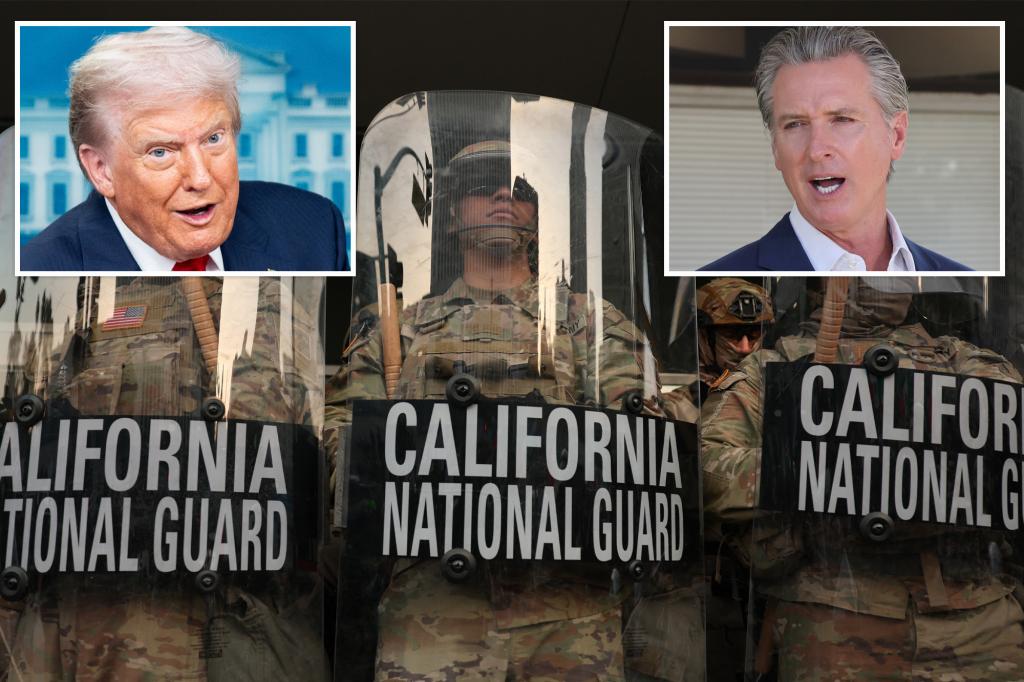Justice Department lawyers were in federal court Monday to defend the Trump administration’s deployment of Marines and California National Guard troops during violent anti-ICE demonstrations in Los Angeles in June.
The three-day trial kicked off in San Francisco, with attorneys for the state arguing the deployment — which California Gov. Gavin Newsom strenuously objected to — violated a federal law against using military forces for domestic law enforcement.
The protests began June 6 as lawful demonstrations stemming from a series of raids conducted by Immigration and Customs Enforcement that saw more than 100 illegal immigrants rounded up around the city.
Hundreds took to the streets, chanting in opposition and waving Mexican flags and anti-ICE signs while clashing with cops and federal immigration officers.
But the protests soon escalated into full-blown riots, with cars burned in the streets, public buildings vandalized and local businesses pillaged by looters.
As the violence dragged on, President Trump announced he was deploying some 4,000 Coast Guard members and around 700 active-duty Marines to the City of Angels to put an end to the anarchy.
Newsom condemned the deployments, saying it amounted to using soldiers as “props in the federal government’s propaganda machine.”
The Trump administration fired back, arguing the state’s sanctuary city laws preventing local law enforcement from upholding immigration laws made federal intervention necessary.
Newsom sued the administration, and federal Judge Charles R. Breyer — a former President Clinton appointee who is overseeing the California bench trial — ruled the deployment was illegal.
However, hours later an appeals court rejected Breyer’s ruling which cleared the way for the mobilization to continue.
By July 1, nearly all of the National Guard members and Marines called to Los Angeles had been released, with around 300 still in the city.
Those remaining on duty are “supporting the request for assistance” from federal law enforcement agencies, William Harrington, former deputy chief of staff for the Army task force in charge of the Guard troops said in court Monday, according to the New York Times.
The trial could set a legal precedent for the extent of a commander-in-chief’s authority over the military on US soil.
Newsom’s lawyers are vehement that sending troops to Los Angeles violated the Posse Comitatus Act, an 1878 federal law prohibiting the president from using armed forces to engage in civil law enforcement.
Attorneys for the state also argue that by deploying troops over the objections of the governor and other California officials, Trump violated the 10th Amendment of the Constitution, which delineates the balance of power between the federal government and US states.
Also being alleged is that Trump and Secretary of Defense Pete Hegseth violated the Administrative Procedure Act, arguing they “lack authority to federalize members of the California National Guard without issuing such orders through Governor Newsom,” the complaint reads.
Trump’s lawyers have staked their counter-argument on a little-known law — Section 12406(3) of the US Code — which permits the president to federalize the National Guard under certain circumstances.
Among them, if the US is in danger of being invaded or currently under invasion, if there is an ongoing rebellion or danger of one occurring, or if the president is unable “with the regular forces to execute the laws of the United States.”
Newsom and California are seeking a formal declaration from the court that Trump and Hegseth’s orders were illegal, as well as injunctive relief, which would prohibit future deployments of the California National Guard without the governor’s express approval.
The bench trial opened on the same day President Trump announced he was placing Washington, DC’s police department under federal control and deploying the National Guard to patrol the streets amid a surge of violent crime in the US capital.
Read the full article here
